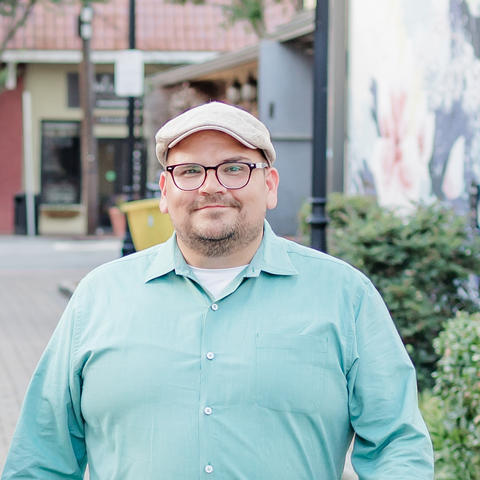
Section Branding
Header Content
Georgia Today: Abortion ban rollback/appeal; Rockdale chemical fire lawsuit; Jimmy Carter's 100th
Primary Content
LISTEN: On the Tuesday, Oct. 1st episode of Georgia Today: Attorney General Chris Carr plans to appeal the rollback of Georgia's abortion ban; a group of attorneys is filing a class action lawsuit in response to the chemical fire in Rockdale County; celebrating President Jimmy Carter's 100th birthday.

Orlando Montoya: Hello and welcome to the Georgia Today podcast from GPB News. Today is Tuesday, Oct. 1. I'm Orlando Montoya. On today's episode, Attorney General Chris Carr plans to appeal the rollback of Georgia's abortion ban. A group of Atlanta attorneys is filing a class action lawsuit against the company responsible for the chemical fire in Rockdale County. And today is former President Jimmy Carter's 100th birthday. GPB is celebrating this milestone across all of our platforms. These stories and more are coming up on this edition of Georgia Today.
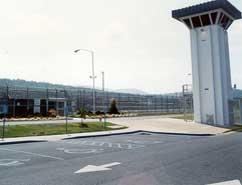
Story 1
Orlando Montoya: In a blistering report years in the making, the U.S. Justice Department says Georgia's prison system is, quote, "deliberately indifferent" to violence among the people in its care. GPB's Grant Blankenship has more.
Grant Blankenship: The words "indifferent" or "indifference" occur over a dozen times in the report that depicts a correctional system where rates of homicide and sexual violence outpace those in other states because of a radically inadequate ratio of guards to the incarcerated. In one instance, a single correctional officer was left responsible for supervising 400 beds. The report from the DOJ's Civil Rights Division, led by Kristin Clarke, says what follows are gangs left in control of prisons where the incarcerated can often unlock their own cells and wander at will. Kristin Clarke:
Kristin Clarke: People are assaulted, stabbed, raped and killed or left to langish inside facilities that are woefully understaffed.
Grant Blankenship: Georgia Department of Corrections disputes the findings and now has 49 days to formally respond. For GPB News, I'm Grant Blankenship in Macon.
Story 2
Orlando Montoya: A judge rolled back Georgia's abortion ban yesterday, but it's not expected to be the last word. A spokesperson for Republican state Attorney General Chris Carr said Carr plans an immediate appeal to the state Supreme Court. The court could put the ban back into place while it considers the case. The Supreme Court has overruled the same judge before on abortion.
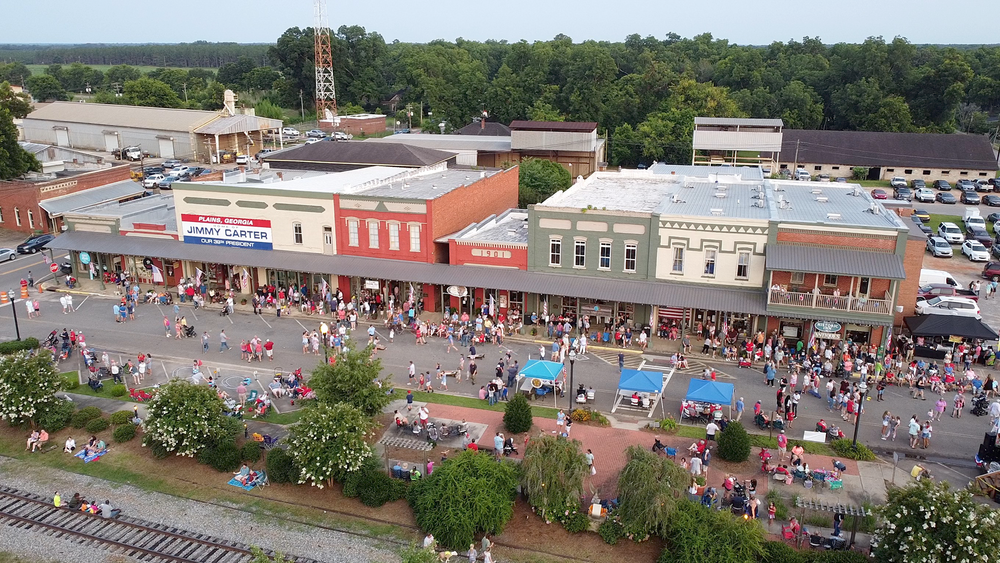
Story 3
Orlando Montoya: Jimmy Carter turns 100 years old today. That makes him the oldest living president in U.S. history. GPB's Sofi Gratas spoke to passengers aboard a special train about President Carter's legacy while en route to Carter's hometown for the annual Peanut Festival.
Sofi Gratas: The Peanut Express stands ready to go. The train is traveling to Plains, Ga., for the Peanut Festival, which Jimmy Carter helped make into one of the small towns biggest attractions.
Sam McMurray: I tell everybody here that our train is longer than the whole town.
Sofi Gratas: That's train volunteer Sam McMurray. The train runs on the same track that Carter and his supporters rode to Washington, D.C., upon his presidential win. It barrels past some of the big red carts used in peanut processing, part of Jimmy Carter's history. Patty Taylor, another train volunteer, embraces Carter's small town roots. She gathers the attention of her passengers.
Patty Taylor: So here's a little story. Right by the train depot, the old train depot, that was his campaign headquarters. There's a dog grave there. It says J-Who "The Depot Dog." And so that was his nickname in the headlines. J-Who is running for president? Who is this person? You know.
Sofi Gratas: Though he only served one term, Carter would go on to create the Department of Education, hire more women and people of color to the federal government than ever before and win the Nobel Peace Prize. As the train arrives into the old depot downtown, the peanut parade gets going. It only runs the length of about six buildings. Jimmy and Rosalynn Carter were last seen together at the parade last year. This year, Jimmy Carter stayed home. He's been under hospice care since last February. Neighbor Martha Fennessy says she misses seeing the Carters around.
Martha Fennesy: How they used to walk in front of my house all the time. It made you feel special.
Sofi Gratas: To celebrate, Fennessy made a special costume for her dog, Abby.
Martha Fennesy: What I did, I made a sign that said, Happy Birthday, President Carter. One happy 100th birthday.
Sofi Gratas: She also joins in with others at the parade to sing Carter "Happy Birthday."
Sam McMurray: And sing loud. So he can hear you up at his house which is just over the way, you're ready?
Sofi Gratas: Back on the train, Carter gets more birthday wishes from passengers. Among them are best friends, Lizzy Battle and Lutherine Young.
Lizzy Battle: We voted for him back in the day. Jimmy Carter is in our era. We just gratefully appreciate everything that he has done for this country.
Lutherine Young: There were so many changes, even for us as Black people. He didn't look down on us and say that he made sure that there was equality amongst us. Most people, you know, they don't — they're not hands on. And I — and I understand why not, because with some it's cruelty going on within the world and different things like that. But that was never something that would've, in my opinion, stopped him from doing some of the things that he did. I think he was a fearless man.
Sofi Gratas: Fearless for his principles, they say, but also for showing the world just how far a peanut farmer could go. For GPB News, I'm Sofi Gratas in Plains.
Orlando Montoya: And we'll have more on Carter's birthday later in this podcast.
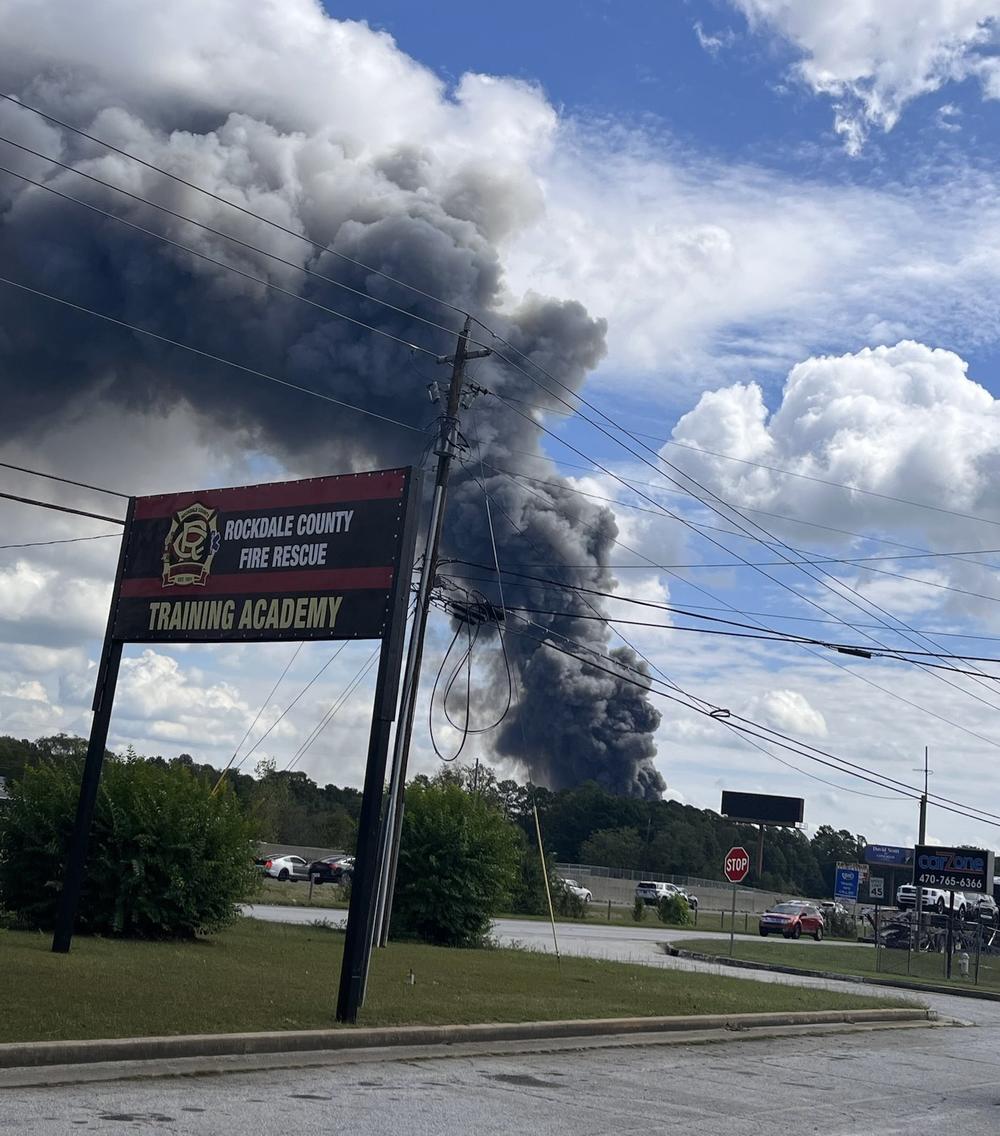
Story 4
Orlando Montoya: A chemical plant fire east of Atlanta is still causing trouble. Two days later, authorities today again told residents in the city's eastern suburbs to shelter in place. Meanwhile, a group of Atlanta attorneys is filing a class action lawsuit against the company responsible for the fire and chlorine plume. GPB's Amanda Andrews reports.
Amanda Andrews: The lawsuit against BioLabs and KIK Consumer Products claims the company's negligence has caused harm to the community and they're seeking financial relief, cleanup and improved safety measures. The suit is open to residents and business owners in Rockdale County. Attorney Chris Stewart says the suit is focused on property damage but they're taking note of other issues.
Chris Stewart: Typically in these situations, the health hazards and the symptoms that are going to be arising right now, we're getting a lot of calls for headaches, burning eyes, coughing, things like that. So this is step one in a long process.
Amanda Andrews: People who believe they've been impacted by the fumes are encouraged to document any issues and contact the attorneys filing the case. For GPB News, I'm Amanda Andrews.
Story 5
Orlando Montoya: President Joe Biden has approved a major disaster declaration for Georgia following Hurricane Helene. White House Director of Intergovernmental Affairs Tom Perez says the action today means Federal Emergency Management Agency funds will be available to affected residents in the 41 counties hit hardest by the storm.
Tom Perez: Some people have lost their homes or have incurred major damage on their homes, and this will enable anyone who had that challenge to access federal funds in the rebuilding effort.
Orlando Montoya: The number of counties in the declaration could grow based on damage assessments. Meanwhile, work continues to restore power. Georgia Power and Georgia's EMCs report about 480,000 electric customers without power this afternoon.
Story 6
Orlando Montoya: Economic researchers at Moody's Analytics are putting initial estimates of damages from Hurricane Helene at between $20 billion and $34 billion. That would make it among the costliest storms in the nation's history. Agriculture is particularly hard hit. The U.S. Department of Agriculture's Robert Bonnie said today his agency's crop insurance program has 20,000 policies for farmers in the storm's path.
Robert Bonnie: Biggest hit are corn, soybeans, cotton, peanuts and orchards. Those policies cover about a $7 billion in liability. That's only a portion of the impacts that we think agriculture will be hit by.
Orlando Montoya: Many Georgia farmers are reporting total crop losses.
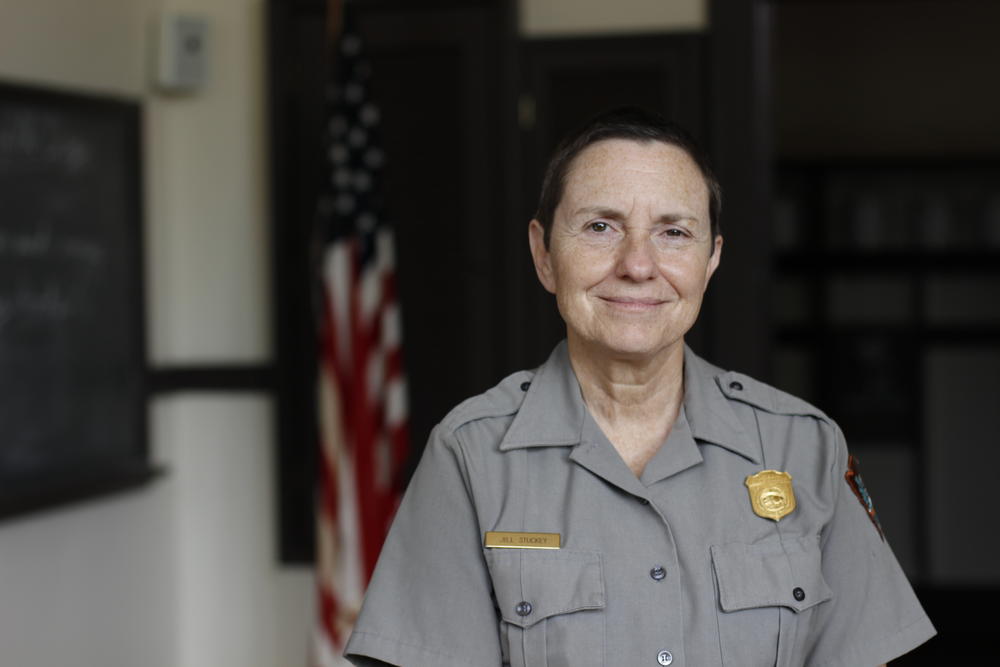
Story 7
Peter Biello: We're broadcasting live from the Carter Center today in Atlanta as we celebrate former President Jimmy Carter's 100th birthday. Today on the program, we're learning more about Carter's extraordinary life from the people who knew him best. Recently, I took a trip to the former president's hometown of Plains, Ga., to speak with someone described as Carter's best friend. Jill Stuckey, superintendent of the Jimmy Carter National Historic Park. We spoke in her office at the old Plains High School. Well, Jill Stuckey, thank you so much for speaking with me about President Carter. I really do appreciate it.
Jill Stuckey: Thanks for having me.
Peter Biello: Tell us about your friendship with President Carter. How did it start?
Jill Stuckey: So I met the Carters in 1994 at the Macon Cherry Blossom Parade. They were grand marshals. My late husband was a good friend of the Carters'. And so that's when I met. So, 30 years ago.
Peter Biello: And when you first met 30 years ago, how did you connect? What did you connect over?
Jill Stuckey: I've been a lifelong fan of President Carter. I was in high school when he was in office, and I loved him then and — and still love him today. And we connect over our same views on world health and a lot of the things that the Carter Center has been — been doing over the decades.
Peter Biello: Is there a story in particular that you know of — you experienced with President Carter — that gives you a sense of who they are? A particular moment?
Jill Stuckey: You know, 30 years gives you the ability to really judge somebody. And I'm fortunate that before I met the Carters, I was huge fans. And after working with them for 30 years, I admire them more today than I did the first day I met them, which is — is very strange because usually your heroes will let you down if you get to meet them. And especially if you get to interact with them regularly over 30 years. These people never let you down. They're the same people day in, day out, behind the scenes, in front of the cameras. They want this world to be a better place. And it's hard for me to not say "they" because when you say "Jimmy," you say "Rosalynn." When you say "Rosalynn," you say "Jimmy." And it's hard for me to — to talk about Rosalynn in the past tense. But they — they love life. They loved helping people. They ate right every single day. They exercised every single day because they wanted to live as long as they possibly could to help as many people as they possibly could. And it was such a privilege for me to get to be kind of behind the scenes watching this go on over the last 30 years.
Peter Biello: Can you give me an example of one of those things you were doing behind the scenes?
Jill Stuckey: So about 2019 or so, both Jimmy and Rosalynn were staying home more. President Carter's cancer diagnosis in 2015 had slowed him down a good little bit. Rosalynn was slowing down as well. So they came to me and they said, "We want to help people in Plains. We're not going to be out and about as much. So we've decided we want to eradicate substandard housing in Plains." And they said, "Go find the substandard housing and then we'll do everything else." So with local help, we were able to find 25 people in Plains that owned houses that needed some assistance. And then they went ahead and raised all the money for that. And so far, we've — or the Carter Plains Foundation's what the Carters' started, [a] nonprofit to raise funds for. And I think so far they have put like 17 new roofs on houses in Plains. There's 15 houses that have good HVAC systems that have been installed that they raised the money for and got donations for rewiring of houses. Big things that, you know, ticket items that are four or five or six thousand dollars these poor folks could never get that money themselves. And Jimmy and Rosalynn made sure that it happened.
Peter Biello: Is there a moment that you have witnessed, being so close to him in Plains, interacting with his neighbors that really exemplifies who he is?
Jill Stuckey: There's — there's so many. But with the Carter Plains Foundation at Christmastime, they would help different families that didn't have Christmas and they would go to their houses and they would deliver the gifts and just watch the joy on people's faces. When a former leader of the free world comes into their house and is delivering Christmas gifts or delivering food to people who need food. And you know just with his 100th birthday. He's not really concerned about turning 100. He's more concerned about — about helping people. And it's — it's never about him. It's always about somebody else. And what — He's always encouraging me to help others. And most people around him, he's encouraged them not to think about themselves, but to think about helping others.
Peter Biello: We are speaking just about two weeks before his 100th birthday. And I understand you saw him this morning. What was he like?
Jill Stuckey: So I'm fortunate I do get to see the president on a regular basis. And, yeah, he was — was happy this morning. And I told him that it was a nice day, that the humidity was finally down a little bit and the crops had gotten some rain. So put a big smile on his face.
Peter Biello: You mentioned that even his 100th birthday is not about him for him. Who is he saying it's about?
Jill Stuckey: We're doing a naturalization ceremony here on his 100th birthday. We have a 100 new — 100 people that will become citizens of the United States on Oct. 1. And things like that is what he cares about, that you know how his 100th birthday can help somebody. I think he's happier about that than a personal milestone. Doesn't mean too much to him.
Peter Biello: What does it mean to you as a close friend of his?
Jill Stuckey: You know, I love it when the Carters get records like the record for the longest marriage in president history. They were married 77.5 years. The record of him being the oldest living president. You know, I love those records because what those records do gain attention. And then the more attention that those records bring, then people learn about his life and his legacy. And that's what I like to see.
Peter Biello: Well, Jill Stuckey, thank you so much for speaking with me. Really appreciate it.
Jill Stuckey: Thanks for having me. Enjoyed it.
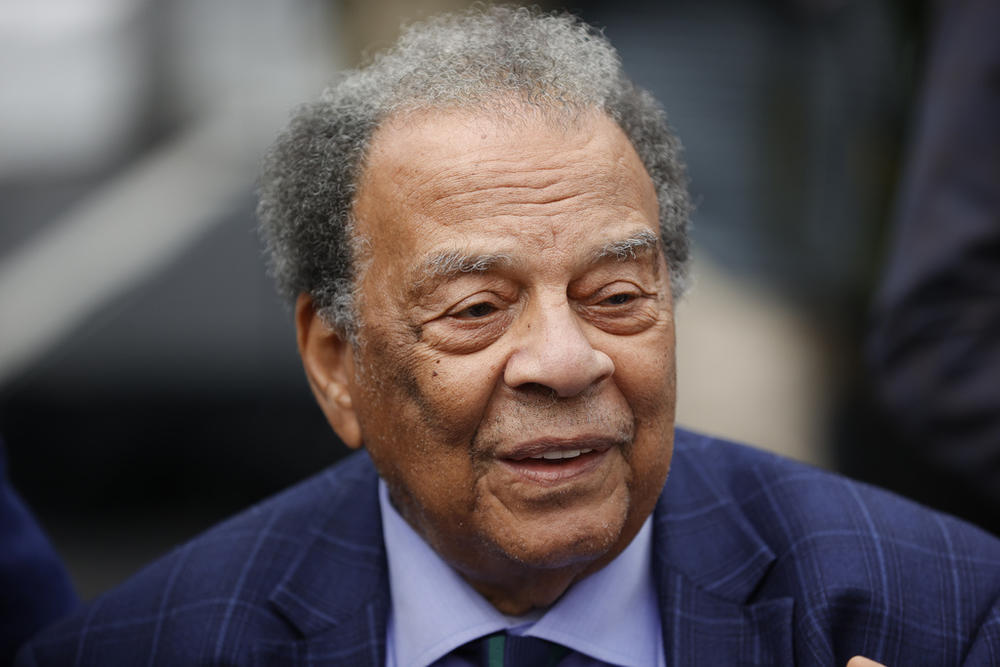
Story 8
Orlando Montoya: GPB's host of Morning Edition, Pamela Kirkland had the chance to speak with someone who knows former President Carter well, former Ambassador Andrew Young, a champion of civil and human rights. Ambassador Young served as U.S. ambassador to the United Nations during the Carter administration, and he joins the podcast today in honor of Carter's 100th birthday.
Pamela Kirkland: I want to start at the beginning. Can you take us back to the first time the two of you met? What were your initial impressions of him?
Andrew Young: The first time I remember meeting Jimmy Carter was when he was a candidate for governor. And I happened to be a candidate for Congress in the 5th Congressional District. And I heard about him. I must confess I was prejudiced because Sumter County was where the civil rights movement was put in jail in 1962. It was a hot day. And suddenly it went from in the 90s to in the 40s and 50s. And I went to Sumter County to try to get the sheriff to let us bring some blankets and coats into the jail — and Dr. [Martin Luther] King [Jr.] was in that jail with Reverend [Ralph D.] Abernathy. Sheriff Chappell's answer was, "They should have thought of that before they broke the law." And I said to Jimmy Carter when I met him at Pascal's Restaurant, "well, the only thing I know about Sumter County is Fred Chappell." He said, "yeah, he's a good friend of mine." Well, that was really not the answer, I thought. But I also saw him doing something I had not done before — that he went to talk to everybody in the restaurant seated in their booths and introduced himself and asked for their support. And then he went to the kitchen and he ignored me and went on into the kitchen. And he came back and he said, "You can never forget the people who prepare our food." And so I was both impressed and dismissed. But that was an interesting conversation. And I never went into a restaurant after that without going into the — into the kitchen and shaking hands and introducing myself to everybody.
Pamela Kirkland: Tell me about when Carter asked you to join the administration as U.S. ambassador to the United Nations. How did that conversation unfold?
Andrew Young: I knew that it was a difficult assignment, but he wanted it difficult. He wanted me to cause trouble. When I was sworn in, there was a piece of paper on the lectern and he had written some notes down on it which said, "I want you to go to Africa as soon as possible, meet as many African leaders as you can, and ask them what they expect of our administration and how we might help them." Well, that was a strong assignment because I don't think we'd had anybody visiting Africa for a long time other than the ambassadors that were assigned there. And when I went back to the State Department, they — they discouraged it. They didn't want to be more involved in Africa. And when I told President Carter that, he said, "But remember, they didn't appoint you. I did. I want you to go to Africa." And I said, "but they said they didn't have any planes." He said, "We have plenty planes here at the White House. Let me know when you're ready." So he looked at Africa from the point of view of a kid in Plains, Ga. His first contact was having a car wash to supply books for a primary school in Nigeria. And so when I — we went to Africa together, I made sure that President Carter and President Obasanjo of Nigeria both took part in the service when President Carter read the Old Testament. He said, "I first heard of Nigeria when our high school class had a car wash to send books and Bibles." And when the president of Nigeria got up, he said, "Mr. President, I want to thank you for those books." He said, "I was a barefoot boy that grew up about 3 miles from there. And those books were the first books I read. And that's probably where I learned to read." And he and Jimmy Carter shook hands and prayed together about the time that they interacted as teenagers; not as presidents, but as Baptists.
Pamela Kirkland: Just thinking about those degrees of separation, just being two boys worlds apart and to be brought back together as presidents. You know, I don't want to say you had the impossible task, because looking at your list of accomplishments, you've — you've done so much. You have such a legacy. But why do you think you ended up with these assignments from President Carter?
Andrew Young: He knew me as a friend because we started relating to each other before either of us were elected. It was just — it was one of God's plans that worked. And it's no accident that it's lasting at least 100 years. He had an agenda that he wanted to do before he passed on. And I think when President Biden stepped down, I think he and God decided that he'd be able to stay here and vote for Kamala Harris. Because I thought that after Rosalyn went, he would be not far behind. And he won't be far behind, but he will stay here long enough to cast that ballot, it seems, because he'll be able to send in his absentee ballot any day now.
Pamela Kirkland: Well, Ambassador Young, thank you so much for speaking with me.
Andrew Young: Well, thank you for covering the life — and I say ministry, because I think that his life has been a blessing from God. And we are much better off because Jimmy Carter grew up amongst us.
Story 9
Orlando Montoya: Georgia Public Broadcasting is celebrating Jimmy Carter's centennial across all of our platforms. On the radio today, Peter Biello, of All Things Considered and Georgia Today broadcast live remote from the Jimmy Carter Presidential Library and Museum in Atlanta. And on GPB-TV tonight, you'll find a very special Carter program: Carter 100: A Celebration in Song. And this concert was recorded live at the Fox Theatre in Atlanta and includes Chuck Leavell, D-Nice, Drive-By Truckers, Eric Church Group, Love, Maren Morris and more. Also on GPB-TV is Plainspoken, a documentary highlighting Jimmy Carter's hometown of Plains and exploring the town's segregated past. There's also a companion podcast for the Plainspoken documentary entitled Plainspoken: Jimmy Carter and the People of Plains. It features even more conversations with President Carter's family and friends in Plains. And you can find more information about all of these programs at gpb.org/carter100. While you're on the website, you can read an interview with a podcast producer who collaborated with musicians such as Darius Rucker, Jon Batiste, Keb Mo and Leann Rimes to set recordings of President Carter's famous Sunday school lessons to music.

Story 10
Orlando Montoya: In Georgia sports, the Atlanta Braves bounced back from a stunning loss in the first game of a makeup doubleheader yesterday to claim the last postseason berth. They did so with a win over the Mets in the second game last night after New York clinched their playoffs trip with a victory in the opener. At the end of a wacky day, there were champagne spraying celebrations in both clubhouses at Truist Park.
Orlando Montoya: And that's it for today's edition of Georgia Today. If you'd like to learn more about these stories, visit GPB.org/news. Take a moment to hit subscribe on this podcast to keep us current in your feed. And if you have feedback, let us know. Email us at GeorgiaToday@gbp.org. I'm Orlando Montoya.

